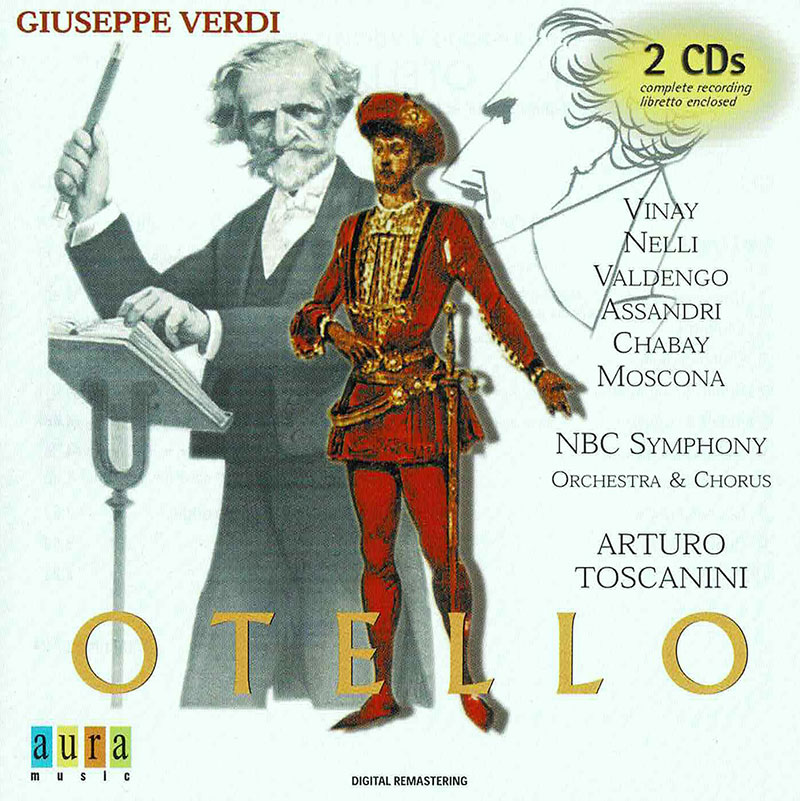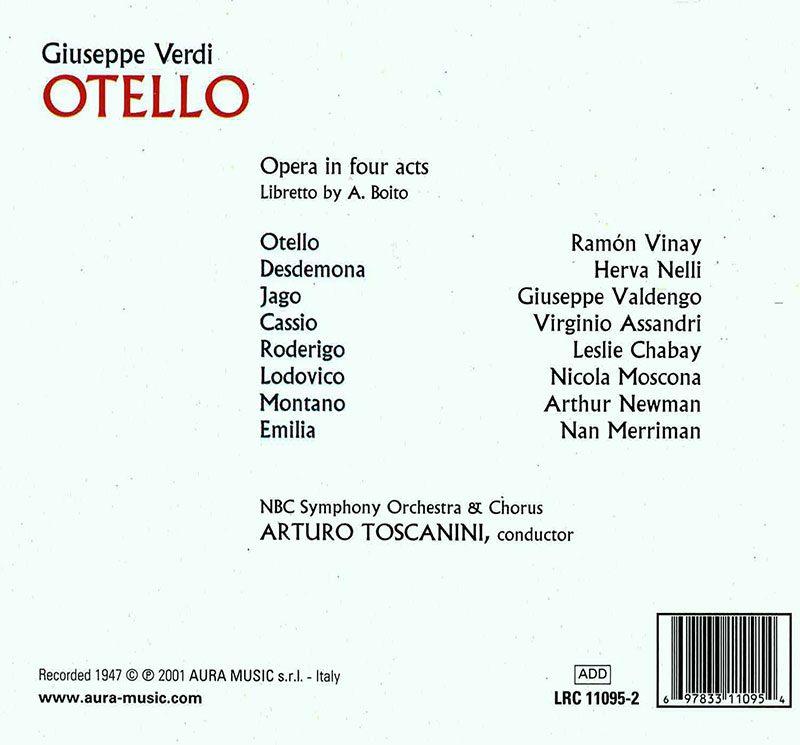Logowanie
Dziś nikt już tak genialnie nie jazzuje!
Bobby Hutcherson, Joe Sample
San Francisco
SHM-CD/SACD - NOWY FORMAT - DŻWIĘK TAK CZYSTY, JAK Z CZASU WIELKIEGO WYBUCHU!
Wayne Shorter, Freddie Hubbard, Herbie Hancock, Ron Carter, Elvin Jones
Speak no evil
UHQCD - dotknij Oryginału - MQA (Master Quality Authenticated)
Chesky! Niezmiennie perfekcyjny
Winylowy niezbędnik
ClearAudio
Double Matrix Professional - Sonic
najbardziej inteligentna i skuteczna pralka do płyt winylowych wszelkiego typu - całkowicie automatyczna
VERDI, Ramon Vinay, Herva Nelli, Giuseppe Valdengo, NBC Symphony Orchestra, Arturo Toscanini
Otello

Ramon Vinay, a Chilean born in 1914 of Italian-French parents, was a supreme dramatic tenor, Heldentenor and baritenore. He always preferred to sing epic, grandiose and fully masculine roles: Wagner' Sigmund and Tristan, Saint-Saens' Samson and, above all, Verdi's Otello in 250 performances. With an ample middle and powerful top registers, little care for timbre and sfumature, more than notable vocal consistency and colour, Vinay had emphatic diction, interpretive strength and vehemence equal to his vocal resources. An incident occurred in 1949 during rehearsals of Otello at the Arena di Verona. In the third act, Vinay exclaimed "Giura e ti danna", jumped violently on Desdemona and pushed her off the stage and down the stone steps. During the actual performance fourth act, he made amends. He let loose the cushion pressed against the face of a terrified Tebaldi and murmured to her "Renata, you sang like an angel...". Gino Bechi, an Italian born in 1913 in Florence, was an exceptional baritono "lungo" (with long extension). He became famous for a great variety of roles in melodramatic romantic operas, Verdi in particular, above all as Figaro (Barber of Seville), Renato (Masked Ball) and Rigoletto. He was a giant of the lyric theatre of all times and in any country. He was a protege of no other than the mythical baritone Titta Ruffo. With a squillo surprisingly rich of harmonics at the top, ample and communicative vocal resources, his final despair "La maledizione!" at the death of Gilda in Rigoletto act IV became renown. In 1937, at the end of the Barber of Seville first act, he was greatly applauded by coloratura soprano Lina Pagliughi, the mythical Gilda of the late 20s onwards. She queried why he had not given an encore of the famous aria "Largo al factotum" and said smilingly: "Dear Bechi, do not show too much timidity. The stage is a battle ground. Remember that he who fires more shots wins". Based on the Shakespearian play, Otello is the finest tragic opera ever written. The genial poet Boito wrote a beautifully compressed libretto that inspired Verdi to write intensely dramatic, dynamic and complex music for great arias, duets and the chorus. Otello' s triumph over the Turks "Esultate!", the sweet and ethereal duet "Gia` nella notte densa", Jago's cynical view on life "Credo in un Dio crudele", the determined oath-taking duet "Si`, pel Ciel marmoreo giuro!", Otello's regret for lost happiness "Dio, mi potevi scagliare", the andante then frenetic ensemble of acclaims "Viva! Evviva!" (Venetian dignitaries, heralds, soldiers, Ladies and Gentlemen) ingrained with brooding utterances "...Emilia, una gran nube turba il senno d"Otello..." (Lodovico, Otello, Desdemona, Emilia, Jago) , Desdemona's soulful prayer "Ave Maria", Otello's dishevelled suicide "Nium mi tema" and last heroic whisper "un altro bacio" ending with solemnly soft orchestral sounds. These are the opera's great moments of inspired music and singing. * * * On 5 February 1887 at the Teatro alla Scala, Milano, Verdi staged the world premiere of the lyrical drama Otello after 16 years of silence. During that period, he reflected for a long time on his experience and the musical evolution of opera. He felt he had to conceive successfully something new to stay abreast of times. Otello was born. Boito became a decisive collaborator. He wrote the libretto "a struttura continua" which allowed the great master to break the old scheme of arias, duets, recitatives and develop a complete, unitary discourse. Collaboration between Verdi and Boito was not easy but the sublime drama took resplendent shape from the continuous exchange and debate between the two. Boito had no intention of breaking from Shakespeare and was tormented at the thought of having been unfaithful to the original play. Evidently, the ancient formula of fusing together "le tre arti" relived in Boito and inflamed him. Writing a libretto based on a drama by Goethe, he had brilliantly fused them in his own opera Mefistofele in 1875. Italians had reproached him for daring to get away from a musical tradition which European currents had shut and isolated. In Otello, the three arts of music, literature and visual art (not painting or sculpture but more appropriately scenography which is strongly suggestive in Otello) were effectively compressed within the intense charge and psychological subtlety of Shakespeare's poetry. Later, Falstaff was equally effective. A youthful Verdi had already attempted to show his love and admiration for the great Englishman by writing Macbeth. This early opera had great value in Verdi's development but failed to represent his full imbuement with the Shakespearian spirit. Otello did not put an end to heated skirmishes which raged in Italy between Verdians and Wagnerians. However, Otello's innovative and fluid orchestration was limpid proof that the Italian old master Verdi, during long and meditative years, had understood that one could grow also on different experiences. Some of the experiences had seen in melodrama "a brilliant lie", a hyperbolic and insane adventure, opposite to what he had believed and been faithful for an entire musical life. * * * Dr. Joseph Fragala, Tenor Watch Host


































